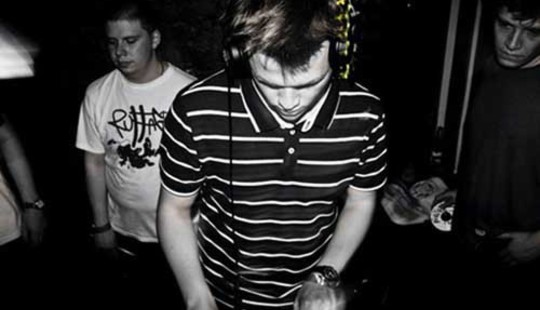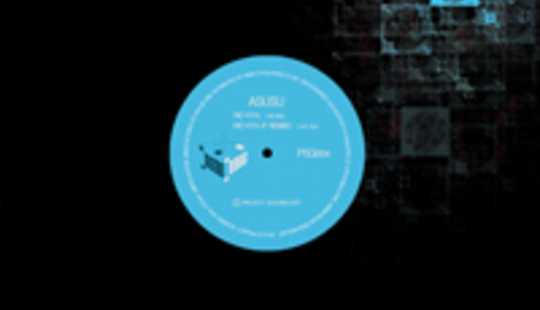In this latest edition of our regular column on UK bass sounds, we explore the ongoing prevalence of house and techno influences within dubstep in 2010, and chat to rising grime producer Becoming Real about his new EP, Spectre, eskibeat and recording with Trim.
Becoming Real: The spectre of eskibeat
Even beyond your typical channels of dance music creation and interaction – the lone bedroom auteur, putting together beats on a dying laptop – this year there’s been a growing school of musicians paring down existing styles and rebuilding them in new forms. And those techniques aren’t genre-limited: in the US the hypnagogic pop set continue to break down the boundaries of reality and dream through fusions of old and new, while the UK has spawned the post-punk/dub deconstructions of Forest Swords, James Blake’s subversions of the pop song and Guido’s colour-saturated visions of modern R’n’B. With the new Spectre EP under his Becoming Real alias, Toby Ridler has done the same to the austere minimalism of Wiley’s early riddims, infusing them with greater rhythmic fluidity and a playful undercurrent largely lacking in the deadly serious aggression of eskibeat.
“The influence has come more from a certain avenue of grime,” Ridler explains when I ask whether he consciously set out to produce grime tracks, in the wake of his far harder to place Fast Motion EP. “I really like the eski style stuff, that really caught my attention - I thought [it] was maybe a bit unexplored.” He reflects for a moment, struggling to find the right words. “I think I was more influenced by grime stretching out of being grime, if you know what I mean?” Later, when asked whether his degree in fine art might have some effect on his writing process, he’s as mercurial as his music: “I find it similar to making a collage, or something like that. Maybe the Spectre tracks are less experimental and have a bit more focus, but I feel like the stuff I’m making right now is a lot more fragmented. Just wanting to toy with rhythm a lot more, but without there necessarily being a song structure there. I like the idea of stretching things, and seeing how far I can stretch them before they don’t really sound like music anymore.”
Becoming Real - 'Like Me' (feat. Trim) [Not Even]
But while both tracks on Spectre still delight in being difficult to grasp, slipping out of reach like plumes of smoke almost as soon as they settle into a groove, the presence of ex-Roll Deep MC Trim acts as anchor. One of grime’s finest MCs, his lazy flow masks a unique ability to combine starkly honest musings with ferocious, barbed wit. Despite the duo only meeting once to discuss his involvement, Ridler is audibly pleased with the result. “He seems able to fit his flow into the song perfectly in whatever way,” he says. “He seems to use all available space and all available rhythms, where I think a lot of grime MCs tend to gloss over that.” During the labyrinthine chaos of ‘Showdown In Chinatown’ Trim’s voice performs stoned acrobatics, ducking and diving between glassy bursts of synth, always threatening to fall off the beat but retaining an unnerving intensity throughout.
And even as Ridler avoids directly attributing the sound of Spectre to London’s influence – preferring to discuss the city on a more abstract level – the capital’s presence hovers, ghostlike, just out of earshot. The sense of fragmented locality that gave rise to grime’s infamous postcode obsession splinters through our conversation. “There just seem to be so many levels and aspects to London. It’s weirdly contradictory, but there’s also this really odd, alien harmony,” he muses.
“I think grime could be so much more [experimental],” he expands later on. “Especially as it’s so integral to so many areas of London. I feel like it could really take on something a bit more lucid, not as concrete – something that’s not necessarily just beats, but also soundscapes. You know that track on Dusk & Blackdown’s Margins Music, I think it’s called ‘This Is London’? That, I think, is touching upon something very fertile: the idea of London, ideas of psychogeography, many different communities, even down to grime crews being from certain areas. I feel like it could be a lot more intertwined with the city and the feel of it, rather than just being simply beats.”
In that sense, Becoming Real’s tracks on Spectre perhaps subconsciously tap into the concepts Blackdown has explored with both his music and his Keysound label – London as its own entity, permeating creative communities, its everyday sounds, sights, smells physically seeping into the very fabric of its music and art. The spaces between beats on ‘Like Me’ are pregnant with their surroundings, brimming with life just beyond easy reach. It’s an idea Ridler’s fond of. “Although [the music] can be very soft and beatless, you could almost get a physical feel for something, the way you can hear ghostly voices,” he enthuses. “It sounds like the song is haunted by that area, rather than the song just being about the area.”
Becoming Real’s Spectre EP is out now on Not Even.

Dropping the pace, upping the groove
The last year has been an intriguing period in the development of dubstep’s progeny. Far from replicating the patterns followed by its siblings UK garage and drum ‘n’ bass (ones of repetition and eventual stagnation) between 2008 and 2009 the skeletal elements of its original form began to billow outward into any number of different shapes. But there was still a tight sense of coherence, a strong feeling that although everyone was pulling in slightly different directions – the future-shocked grime’n’B of Joker and Guido; Appleblim and Scuba’s techno-infused rollers; Peverelist’s deconstructed jungle; wracked synthwork on Hyperdub – the planned destination remained the same for all. Of course, that was an illusion, in so far as there was never an overarching plan or an eventual aim. Rather, this was exploration for its own sake, subconsciously drawing in influence from across the board to craft new variants on a surprisingly flexible template. So it was perhaps inevitable we’d reach this current point in 2010, where these separate strains have pulled away from the main body just enough to loosen from the central anchor holding them in check.
This has given rise to an urban sprawl of a musical landscape, one where Mount Kimbie, Darkstar and James Blake can coexist alongside the blurred hip-hop of Girl Unit’s ‘Wut’, where day-glow two-step from Blunted Robots collides with the sucker punch bass of Superisk’s grimey ‘Find Your Way’. There’s a frustration that arises from such a spray of ideas - where once there was a feeling of total inclusion, at the moment it’s tough to bring every strand together. That said, there have been definite trends emerging from the morass, and the gradual slowing of dubstep’s tempo to 135bpm and below has ushered in greater influences from classic house and techno. Thanks in part to UK funky opening the floodgates, the last few months have found a greater number of producers putting out material that’s increasingly untethered to the rigid rhythm and tempo restraints put on ‘traditional’ dubstep.
Foremost among them (seemingly as ever) has been the shapeshifting Hessle Audio label – and no producer this year has come closer to a wholescale rewiring of the template than one of its founders, David Kennedy. Never one to stick rigidly to convention in the first place, over the past twelve months his music as both Ramadanman and Pearson Sound has reached new heights of focus and intensity. It’s as if someone’s reached inside its cells and tampered with its very DNA, shuffling base pairs around into entirely new configurations, leaving the results seemingly alien on the surface but achingly familiar just beneath. His six-track self-titled EP on Hessle remained the most rooted in his earlier music, though still broke outward in bold new directions: two jittery junglist tracks – ‘A Couple More Years’ and ‘Don’t Change For Me’ – brought a Detroit-infused emotional resonance to the forefront that had previously only been hinted at. From there his release schedule, and each subsequent development, has operated at breakneck pace.
Ramadanman - 'Don't Change For Me' [Hessle Audio]
Ramadanman – 'Grab Somebody' [white]
Kennedy’s forte has always been percussion, even as far back as early Hessle track ‘Blimey’, which consisted of little more than cleverly stacked drums, tightened into a series of increasingly urgent syncopations. These traits haven’t changed, though they have gradually sharpened into razorlike weapons. Crucially, a mastery of melody and synthesis has begun to wind its way through his recent tracks. The manic footwork clouds of ‘Work Them’ suddenly break in the middle, allowing an orchestral ray of light to burst through and throw its percussive tics into sharply silhouetted relief. The whipcrack house of ‘Grab Somebody’ utilises the same trick, tensely offsetting the track’s floorfilling sentiments with an aural elegy cut from the same cloth as Burial’s Untrue. And the utterly gorgeous shimmer-and-release dynamics of ‘Tempest’ extend those brief moments out to full track length, harmonic tension stretched to breaking point before the ground suddenly drops away and tsunamis of sub-bass wrestle for control.
Along with the rest of his music this year, very few overt ties to dubstep remain in these tracks. Instead the genre’s low-end rumble serves to carve out space for mutant forms of house music, beats twisted into coiled arabesques or stretched outward into vast, sparse expanses (as on his bewitching remix of Jamie Woon’s ‘Night Air’). What Kennedy appears to intrinsically grasp – and where the wobble brigade got it oh-so-wrong – is that dubstep in the first instance was always about restraint, placing as much emphasis on what wasn’t present as what little was. In transplanting that understanding to other forms (house, footwork/juke, grime, drum ‘n’ bass) he’s carved out a unique cross-genre signature sound.
Jamie Woon – Night Air (Ramadanman Remix) [Candent]
Elgato – Tonight [Hessle Audio]
And if Carl Craig’s upcoming remix of Kennedy and Appleblim’s ‘Void 23’ wasn’t already indicative enough of a shift in attitude, Detroit’s influence, always latent in early forms of dubstep, has become more pronounced than ever. New Hessle signing Elgato’s debut 12” is positively infused with the city’s potent cocktail of reality and memory, still uniquely London but casting its eyes wistfully across the pond. Labelmate Untold has just put out a new 12” on R&S that unites the edgy grime fusions of his recent material with a mechanistic, retrofuturistic aesthetic. ‘Stereo Freeze’ has a vintage Juan Atkins feel, all pulsating factory-line rhythms and hammerblow synths, and blissed-out house jam ‘Mass Dreams Of The Future’ is a potent reminder of just how influential Kraftwerk’s music remains even now, stretched out along a seemingly endless striplit autobahn.
And even in Bristol, which tends to be associated with dubstep in the stricter sense of the word, there have been characteristically seismic shifts occurring across the spectrum. In 2008, when Appleblim’s Dubstep Allstars mix was released, the much-vaunted techno crossover found its resolution in propulsive rollers from the likes of 2562, Martyn and Peverelist. In 2010 its presence is more insidious; the breakneck pace is slowing and wider spaces are opening. Tectonic head Pinch recently released the astonishing ‘Croydon House’, a loping monster of a track driven by abyssal low-end. Hyetal’s collaborations with Peverelist and with local house producer Julio Bashmore (as Velour) both stagger, gaudy and cocaine-laced, into the glare of club spotlights. The Idle Hands label continues to streamline its output after a compulsively brilliant 12” from Kowton earlier this year: the next two releases feature Headhunter’s new-age filtered ‘Lost Prophet’ and Kowton’s deftly swung house jam ‘She Don’t Jack’. And Headhunter’s Addison Groove alias continues to take over unabated, spearheading the current vogue for footwork-ish 808 patterns but operating in a grey area that’s entirely his own: unreleased track ‘Sexual’ melds the champagne excesses of UKG to machine gun drum chatter, to dizzying and bewitching effect.
Addison Groove – ‘Sexual’ (radio rip)
Kowton – ‘Countryman’ [Keysound]
In many cases producers who started out in dubstep and grime have simply continued to shift ever-further from their original stomping grounds, dropping the pace and upping the groove, taking advantage of the space inherent in their music to impose new rules. At the forefront of that shift this year has been a handful of labels, each refreshing and redefining the precedents they’d previously set: Hotflush, Loefah’s Swamp81 imprint, a rejuvenated R&S, Aus Music. Alongside the rising profiles of Joy Orbison, Pariah, George Fitzgerald and Braiden, there’s a sense of increasing divergence and diversity, even as huge swathes of the surrounding community remain tight-knit.
And the pick of this month's releases...

Digital Mystikz – Education/Horrid Henry [DMZ]
DMZ releases are like buses: you wait for ages, then three come along at once. Hot on the heels of Mala’s beguiling Return II Space, and just before the release of Coki’s Urban Ethics album, this week sees another formidable 12” emerge from the ranks. Coki’s ‘Horrid Henry’ finds him in typical robot-crushing form, but Mala’s contribution, as ever, is where it begins and ends: ‘Education’ is a long-awaited staple of his DJ sets and one of the finest tracks he’s ever produced. Poised above a dread-filled precipice, its slow synth cycles and wisps of dub vocal brim with unspoken emotion, and lapses into periods of drifting ambience only serve to emphasise the crushing weight when it hits full force. A potent reminder of the tensile power still coiled into ‘proper’ dubstep.
Girl Unit – Wut EP [Night Slugs]
There’s been no shortage of excitable chatter about Girl Unit’s incandescent ‘Wut’ over the last few weeks, largely driven by the fact that it’s a monstrous leap forward in scope for the London producer. While the stuttering juke-isms of his debut 12” I.R.L elevated it to forward thinking dancefloor hit, this second release takes him closer still to the curious states of stasis achieved by both dirty south and chopped ‘n’ screwed hip-hop. Built around a pitched-up vocal sample and synths stacked like multicoloured Duplo blocks, the title track resembles as a beautifully crafted hip-hop instrumental that’s come unstuck in time and space, steeped in London attitude but curiously placeless – and so much the better for it.
Girl Unit - 'Wut' [Night Slugs]
The doomier climes explored by both B-sides, meanwhile, expose many witch house artists for the one-dimensional trippers they are, twisting vocals like so much putty into increasingly demented shapes. Like Salem given a shot of steroids and a humour implant, ‘Every Time’ terrifies as much as it electrifies.
Taylor – CMB [Super]
 Wigflex co-founder Taylor throws a sumptuous curveball here; ‘CMB’ is so waiflike it might barely seem to exist at all, were it not for the tight, jazzy syncopations that slink above its spiny backbone. Another example of a producer working in that deliciously grey area where genres collide/collapse (alongside labelmate The Hizatron), ‘CMB’ is still one of the sultriest pieces of house music I’ve heard all year. You can almost visualize it looking coyly over one shoulder, beckoning you on before suddenly, cruelly dissolving into the crowd. Girl Unit’s remix is transgressive and thrusting, that ‘what might have been?’ moment crystallized in audio form.
Wigflex co-founder Taylor throws a sumptuous curveball here; ‘CMB’ is so waiflike it might barely seem to exist at all, were it not for the tight, jazzy syncopations that slink above its spiny backbone. Another example of a producer working in that deliciously grey area where genres collide/collapse (alongside labelmate The Hizatron), ‘CMB’ is still one of the sultriest pieces of house music I’ve heard all year. You can almost visualize it looking coyly over one shoulder, beckoning you on before suddenly, cruelly dissolving into the crowd. Girl Unit’s remix is transgressive and thrusting, that ‘what might have been?’ moment crystallized in audio form.
JTRP – JTRP EP [Deep Teknologi]
The Deep Teknologi stable has been recently pushing a tough-as-hell take on house, finding a tumultuous middle ground somewhere between continental styles and the soca skip of UK funky. German duo JTRP’s debut for the label finds common ground with producers like Martin Kemp and Bowly: those melting rigid four-to-the-floor into broken beats that flow like mercury. ‘You Want It’ drives forward with haunted stabs of organ and a voice crying out from beyond the digital void; ‘Dungeons’ pushes deeper still, alternating wildly between raw-edged fire and periods of almost deafening near-silence.
Asusu – No Kya [Project:Squared]
 The Project:Squared label has been responsible for some intriguing techno crossover sounds in the last year, but remains locked firmly in the dubbed-out, Bristolian sensibility. This fourth release sees Bath producer Asusu’s mighty ‘No Kya’ finally hit wax, after floating around on dubplate for a year or so. It’s a mini-masterclass in understated arrangement, setting a mournful shredded vocal atop a monochrome backdrop, surface eddies masking a deadly riptide drag just beneath. F thickens its heft further, swapping ghostly atmosphere for a series of gut-wrenching body blows.
The Project:Squared label has been responsible for some intriguing techno crossover sounds in the last year, but remains locked firmly in the dubbed-out, Bristolian sensibility. This fourth release sees Bath producer Asusu’s mighty ‘No Kya’ finally hit wax, after floating around on dubplate for a year or so. It’s a mini-masterclass in understated arrangement, setting a mournful shredded vocal atop a monochrome backdrop, surface eddies masking a deadly riptide drag just beneath. F thickens its heft further, swapping ghostly atmosphere for a series of gut-wrenching body blows.
Rory Gibb co-edits Always Everything, a ‘zine dedicated to the border regions where barriers break down.






















